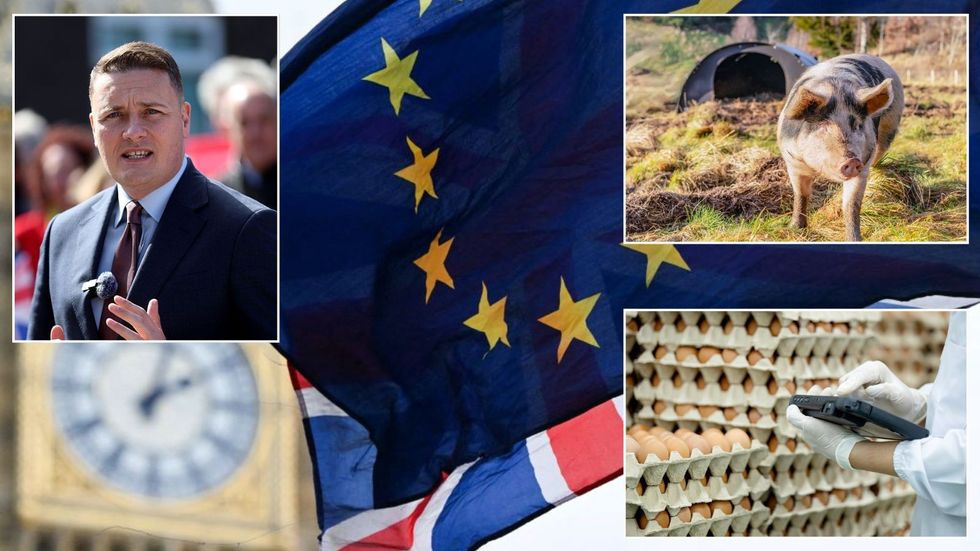Sir Keir Starmer has agreed to align the UK with EU food standards during his ‘Reset Summit’ held on Monday.
The Prime Minister’s decision effectively hands control of “every aspect of food production and safety in the UK” to the European Union, according to critics.
The agreement, made during the summit on May 18, also gives the EU authority over what food Britain may import from countries outside the bloc.
This marks a significant shift in the UK’s post-Brexit relationship with the EU, with supporters claiming alignment will lead to higher food standards and improved public health outcomes.
Sir Keir Starmer has agreed to align the UK with EU food standards during his ‘Reset Summit’ held on Monday
Getty
However, the decision to align with EU food standards has raised concerns, particularly given several major food safety scandals that occurred while Britain was previously under EU regulations.
One such incident took place in 2020, during the Brexit transition period, involving contaminated pork.
According to the European Working Community for Food Inspection and Consumer Protection (EFWFC), consumers were exposed to “an avoidable risk” after EU regulations reduced official controls in food inspections.
The scandal involved pork products containing “pus from abscesses and tuberculosis lesions from pigs’ heads” entering the food chain, with meat from infected pigs’ heads being used in pies, sausages and other processed foods consumed by millions of Britons.
The reduction in EU food safety requirements involved changing pig meat inspection from thorough examination to visual-only checks.
Ron Spellman, Deputy Secretary of the EFWFC representing EU meat inspectors, explained the serious implications: “Inspectors stopped cutting lymph nodes in pigs’ heads, which are known to contain abscesses and tuberculosis lesions.
“Under previous systems, the pigs’ head would have been rejected for food, but now the meat is minced to make sausages and meat pies, spreading the pus from the abscesses and TB material throughout these products.”
LATEST DEVELOPMENTS:
Spellman suggested these changes were not scientifically motivated but “politically motivated to give the meat industry what they want: the reductions and eventual removal of official independent meat inspection.”
In 2017, three years before Britain’s EU departure, a major food scandal erupted involving contaminated eggs from Belgium and the Netherlands.
The Food Standards Agency discovered approximately 700,000 tainted eggs had entered the UK food chain, prompting product withdrawals from major supermarkets including Sainsbury’s, Waitrose, Morrisons and Asda.
The FSA stated at the time: “Some of the products made from these eggs will have had a short shelf life and will have already been consumed, however, we identified some that were still within the expiry date. These are now being withdrawn by the businesses involved.”
The incident sparked a significant scandal across the EU, with both Belgium and the Netherlands attempting to blame each other for the contamination.
A third food safety concern involves the EU’s stance on chlorine washing.
While the EU has been vocal in opposing chlorine-washed chicken imports, particularly from the United States, it permits chlorine washing for fruits and vegetables produced within the bloc.
The decision to align with EU food standards has raised concerns, particularly given several major food safety scandals that occurred while Britain was previously under EU regulations
Getty
The industrial washing of fresh produce with chlorine is standard practice under EU regulations.
This apparent contradiction raises questions about the consistency of EU food safety standards.
The European Commission maintains that the EU “retains some of the highest food safety standards in the world,” yet the Food Standards Agency reported 2.4 million cases of foodborne disease in the UK in 2018, resulting in 222,000 GP visits and 16,400 hospital admissions.
The European Commission has defended its standards, stating that “any meat with lesions indicating an animal disease such as TB, or abscesses, or any pathological or organoleptic changes, must be considered as unfit for human consumption.”
However, meat inspectors counter that visual-only inspections make this impossible, with Spellman noting: “There’s no way to see those little abscesses, little tuberculosis lesions, without cutting those lymph nodes.”
As Sir Keir Starmer commits Britain to realigning with EU food regulations, these past scandals raise significant questions about whether such alignment will genuinely improve food safety for British consumers or potentially reintroduce risks that Brexit had eliminated.


